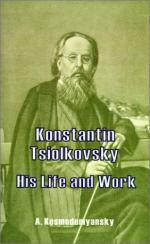|
This section contains 1,793 words (approx. 6 pages at 300 words per page) |

|
Born September 17, 1857 (Izhevskoye, Russia)
Died September 19, 1935 (Kaluga, Russia)
Russian aerospace engineer
Konstantin Tsiolkovsky (pronounced KAHN-stan-tyeen tsee-ohl-KAHV-skee) was one of the greatest Russian scientists of the early twentieth century. Along with American physicist Robert Goddard (1882–1945; see entry) and German physicist Hermann Oberth (1894–1989; see entry), he is considered a founding father of spaceflight. Almost entirely self-educated, Tsiolkovsky studied and wrote about a wide range of scientific topics, but he is best known for his pioneering work in astronautics. In the 1890s he began calculations on the mathematics and physics of spaceflight, which he saw as the first step in the colonization of space by humans.
Throughout his life Tsiolkovsky saw himself as a scientist who not only worked on abstract problems but also strived for the betterment of human existence. On October 4, 1957, twenty-two years after his death, the Soviet Union launched Sputnik 1, the world's first artificial satellite (an...
|
This section contains 1,793 words (approx. 6 pages at 300 words per page) |

|


